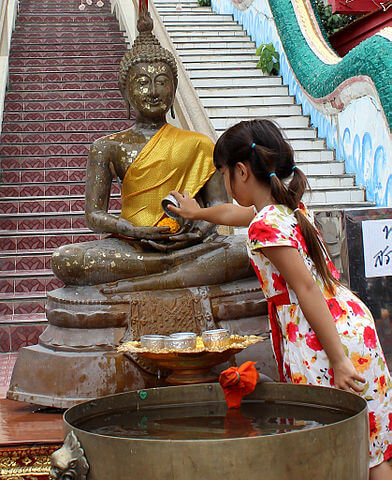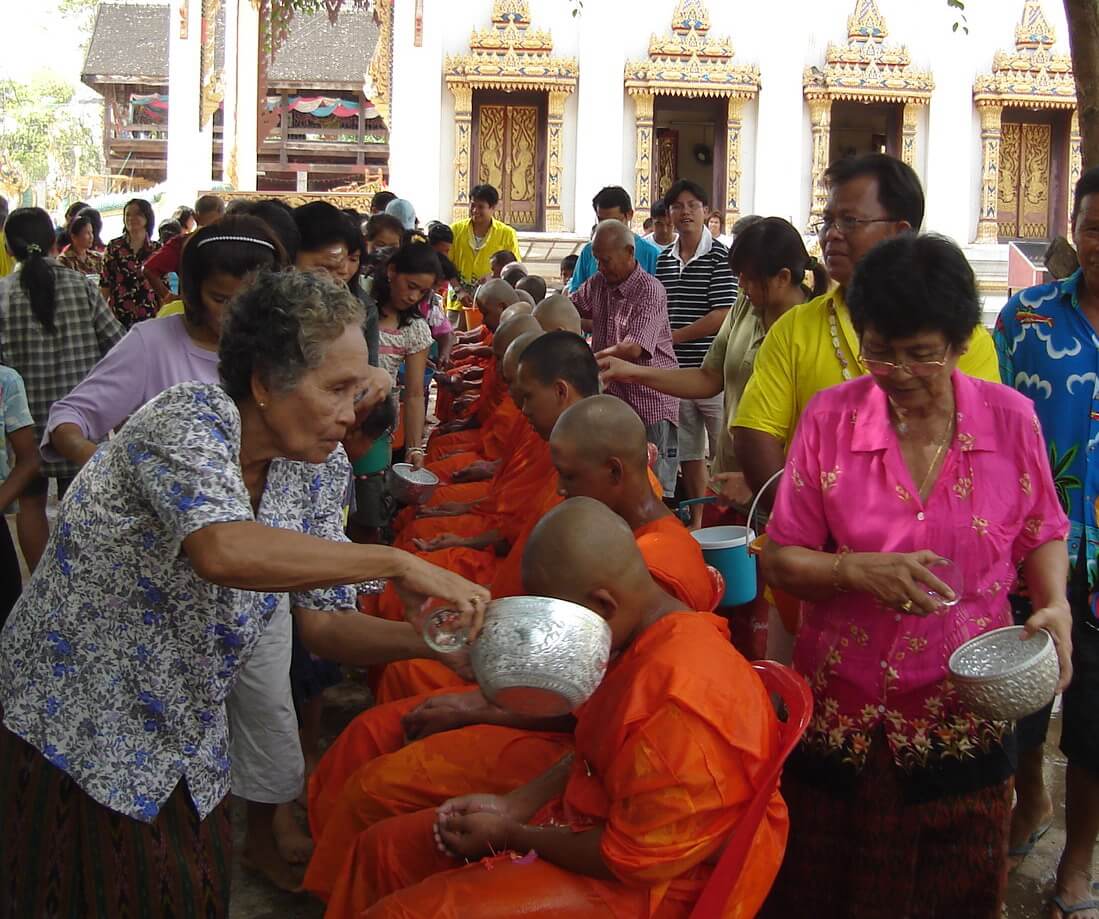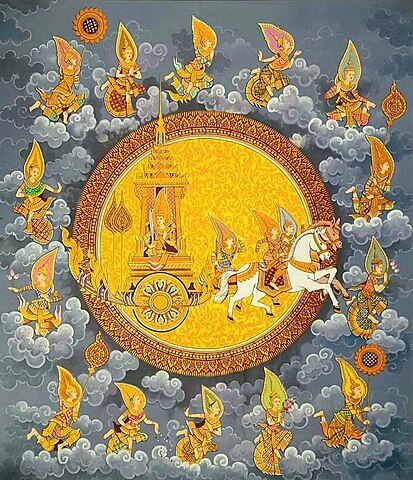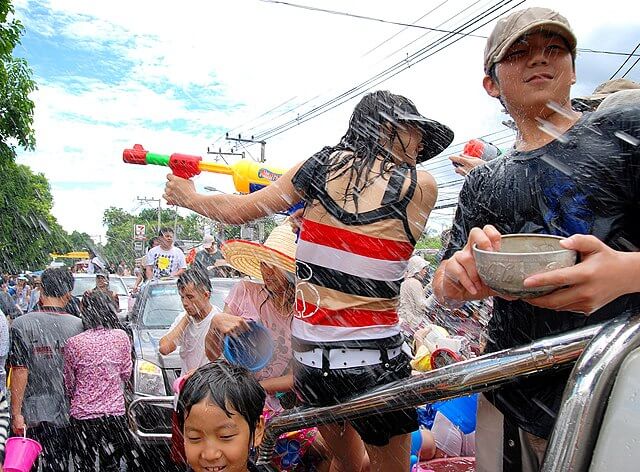Origin and Meaning of Songkran Festival
Songkran Festival, also known as Songkran, is an important New Year festival celebrated in Thailand and other Southeast Asian countries (such as Laos, Myanmar, Cambodia) usually held from April 13th to 15th. The meaning and customs of this festival are deeply influenced by Buddhist culture, symbolizing purification and blessing.
The word "Songkran" comes from the Sanskrit word "Sanskrit", meaning “the sun’s movement into a new zodiac”, symbolizing the beginning of a new year.
Songkran Festival originated from ancient religious rituals, these activities all include religious significance of cleansing body and mind with water. Over time, Songkran Festival has gradually evolved into a social celebration, attracting many tourists to participate.
Songkran Festival is not only a New Year celebration but also an important traditional ritual in Thai culture, reflecting people’s emphasis on purification, blessing and family reunion.
Customs and Activities of Songkran Festival
| Custom | Meaning |
|---|---|
| Buddha Bathing Ceremony | Bathing Buddha statues, people wash Buddha statues with perfume to show respect. Bathing monks, devotees gently sprinkle perfume on monks and offer robes to express respect and seek blessings. |
| Water Offering Ceremony | During family gatherings, younger generations perform “water offering ceremony” to elders to show respect and apology, and hope to receive blessings. |
| Street Water Splashing | This is the most representative activity of Songkran Festival, people splash water on each other in the streets, symbolizing mutual blessings and celebration. Water can be splashed using hands, containers or other tools, but high-pressure water guns are usually not allowed to avoid safety hazards. |
| White Powder Smearing | Smear white powder mixed with water on each other, this white powder is “limestone”, which is mixed with perfume during wedding ceremonies and dotted on newlyweds’ foreheads, when moving to new homes, buying new cars, monks will also dot it on objects, some people even use it as a face mask for skin care. However, the government has discouraged it in recent years due to damaging city appearance, concerns about eye irritation and some people reporting feeling harassed. |
| Animal Release and Temple Activities | People bring offerings to temples to make offerings to monks and perform good deeds such as releasing animals to accumulate merit. |
| Elder Respect Ceremony | Splash water on elders and ask for blessings to express respect |
| Sand Pagoda Building | Build sand pagodas in temples to pray for peace in the coming year |


Why Splash Water?
| Custom | Meaning |
|---|---|
| Purification and Blessing | Water splashing symbolizes washing away misfortunes and troubles from the past year to welcome the new year |
| Seeking Blessings | Water splashing is seen as a way to express blessings, representing prayers for good luck and blessings |
| Cooling Down | During Thailand’s hottest months, water splashing also has practical cooling effects |
What Should Tourists Pay Attention to During Songkran Festival?

| Item | Suggestion | Explanation |
|---|---|---|
| Clothing | Recommended to wear light and waterproof clothing, avoid overly revealing clothes | Although water splashing will make clothes wet, wearing bikinis or overly thin clothing may lead to sexual harassment issues. It is recommended to wear dark-colored and non-transparent clothes to maintain respect and safety |
| Electronic Devices | Pay attention to waterproof protection for electronic devices | As water splashing activities will make the surrounding environment very humid, it is recommended to use waterproof cases to protect phones and other electronic devices |
| Valuables | Protect valuables from loss or damage | In such a lively and chaotic environment, it is recommended not to carry valuables to avoid loss or damage |
| Safety Considerations | Avoid dangerous actions, follow local regulations, don’t bring high-pressure water guns | During Songkran Festival, people will splash water on each other in the streets, so avoid dangerous behaviors that might cause injury to others |
| Keep Smiling | Don’t get angry, must play with a smile | When being splashed with water, keep smiling and respond with “Happy Songkran” to enhance the festive atmosphere |
| Be Prepared to Get Wet | Recommended to wear appropriate footwear like slippers | Be mentally prepared before going out, as it’s common to encounter mutual water splashing and blessing on the streets |
| Respect Others | Avoid splashing water on monks, elders, children and police officers on duty | Avoid unnecessary conflicts |
| Cultural Respect | Understand and respect traditional cultural meanings | Songkran Festival is not only a celebration but also an important moment to showcase Thai culture, respect local cultural customs and avoid disrespectful behaviors |
If you don’t want to get splashed with water, it’s best not to join any water splashing or interactive activities, just keep your distance. You can choose to watch the activities in less crowded places or stand at the edge of streets, avoiding areas with dense crowds.
What Are the Customs or Ways of Celebrating Songkran Festival in Different Regions?

Thailand
| Custom | Description |
|---|---|
| Name | Songkran |
| Water Splashing Activities | Large-scale water splashing activities are held throughout Thailand during Songkran Festival, especially in Bangkok, Chiang Mai and Pattaya. People splash water on each other to pray for blessings and drive away bad luck. |
| Buddha Bathing Ceremony | Besides water splashing, Thai people also perform Buddha bathing ceremonies, which include washing Buddha statues with perfume and sprinkling water on monks to show respect. |
| Family Gatherings | April 14th is designated as Family Day, where younger generations perform “water offering ceremony” to elders to express respect and seek blessings. |
| Common Activity Areas | Bangkok (Khao San Road, Silom Road), Chiang Mai (Old City), Pattaya (Around the Beach), Ayutthaya, Phuket |
Laos
| Custom | Description |
|---|---|
| Name | Boun Pi Mai |
| Water Splashing Customs | In Laos, Songkran Festival (Boun Pi Mai) also focuses on water splashing, symbolizing purification and blessing. People splash water on each other in the streets and participate in traditional dance and music performances. |
| Animal Release Ceremony | Similar to Thailand, Laotians also release fish and other animals to accumulate merit and pray for peace in the coming year. |
| Common Activity Areas | Laos Capital Vientiane, Luang Prabang |
Myanmar
| Custom | Description |
|---|---|
| Name | Thingyan |
| Thingyan | Myanmar’s water festival is called Thingyan, celebrations usually last for a week. People set up water splashing stations on streets and splash water decorated with perfume and flower petals on each other. |
| Religious Ceremonies | Besides water splashing, Myanmar people also participate in temple religious ceremonies, prayers and offerings. |
| Common Activity Areas | Yangon, Mandalay |
Cambodia
| Custom | Description |
|---|---|
| Name | Chaul Chnam Thmey |
| New Year Celebration | Cambodia’s water festival (Chaul Chnam Thmey) is usually held in mid-April for three days. People hold family gatherings, participate in traditional games and dance performances. |
| Purification Ceremony | Cambodians also perform purification ceremonies, including washing Buddha statues with perfume and offering water to elders to pray for happiness and health in the coming year. |
| Common Activity Areas | Phnom Penh, Krong Siem Reap |
Chinese Dai People
| Custom | Description |
|---|---|
| Name | Baihet (Dai Water Splashing Festival) |
| Traditional Customs | Chinese Dai people’s water festival (Baihet) is celebrated in mid-April, main activities include dance, music performances and mutual water splashing. |
| Ancestor Worship Ceremony | Dai people also perform ancestor worship ceremonies to express respect and gratitude to ancestors. |
| Common Activity Areas | Xishuangbanna |
These water festival customs in different regions not only show the uniqueness of each culture but also commonly reflect the emphasis on New Year blessings and purification.
Frequently Asked Questions
Why Can’t You Splash Water on Monks, Elders, Children and Police Officers on Duty During Songkran Festival?
| Reason | Explanation |
|---|---|
| Respect for Religious Beliefs | Monks are seen as sacred roles in Thai society, splashing water on them is considered disrespectful. This taboo reflects respect for Buddhist culture and tradition |
| Respect for Elders | Elders are highly respected in Thai culture, water splashing is seen as disrespectful or offensive. Therefore, avoiding splashing water on elders is out of respect and protection for them |
| Protection of Children and Vulnerable Groups | Children and patients are relatively vulnerable, water splashing may cause their discomfort or fright. This taboo aims to protect these groups and avoid unnecessary risks |
| Safety of Police Officers on Duty | Not splashing water on police officers on duty is to ensure they can effectively maintain order and safety. Water splashing may affect their work and even lead to accidents |
Reference
- 潑水節 - 維基百科,自由的百科全書
- Songkran (Thailand) - Wikipedia
- 泰國潑水節冷知識合集 為何要向他人潑水?泰國新年還會怎樣過?
- 泰國潑水節你不知道的8件事!竟然要吃這種食物
- 2024泰國潑水節由來?延長為5天,日期禁忌習俗懶人包一次看
- 潑水節 - 節慶與活動 - 認識泰國 - 泰國觀光局
- 泰國潑水節怎麼玩?「2023日期、由來與習俗、活動行程、旅遊禁忌」懶人包
- 【泰國潑水節】泰國新年宋干節(Songkran)由來、習俗知多少
- 泰國潑水節濕控攻略|準備好來泰國濕身了嗎?活動地點、禁忌與注意事項一次告訴你 - VERSE
- 泰國潑水節2024怎麼玩? 春山相館教你玩
- 2024泰國潑水節怎麼玩?怎麼安排?看這篇就對了! | 旅遊 | 聯合新聞網
